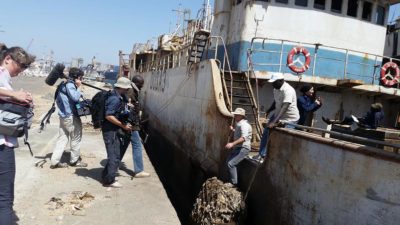One of the focuses of our filming in Senegal was to look at the impact of illegal fishing on the Senegalese fishing industry. We are working with Dyhia Belhabib Ph.D, from the Sea Around Us of the University of British Columbia, and highlighting her research into quantifying illegal fishing in West African waters.
Trying to calculate just how much fish is stolen by illegal fishing boats requires real detective work. Dr. Belhabib has been working with the fishing control and protection agency in Senegal, the DPSP, to gather information on the number and size of illegal boats fishing in Senegalese waters. Cheikh Fall heads up that agency and when we caught up with him he had a recent coup in the fight against illegal fishing that he wanted to share.
Getting to the Asian Warrior
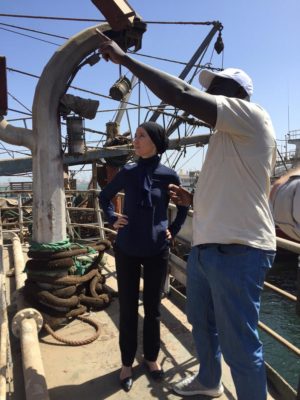
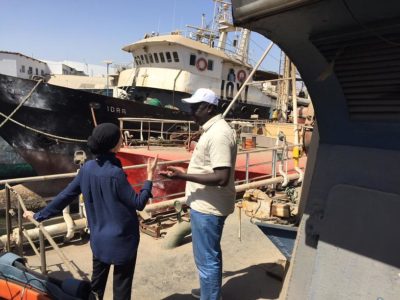
Dr. Belhabib discusses the capture of the illegal fishing boat Asian Warrior with Cheik Fall.
He and his team in Dakar had seized the black-listed illegal fishing boat now known as the Asian Warrior but until recently known as Kunlun. Sitting four boats deep in the harbor, the challenge was to get to the Asian Warrior. It involved a sickening 5-foot-wide leap, with our camera gear, across a 30 foot plunge into Dakar harbor.
Dyhia Belhabib took her mind off the danger. “As we jumped from one boat to another, I could think of the poverty they cause, the poor conditions of fishers onboard, the slavery, the destruction of ecosystems, I had only one thing in mind: why don’t they sink it?”
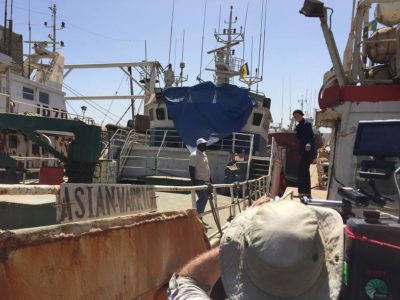
Dr. Belhabib boards the captured Asian Warrior, a notorious illegal fishing vessel, and wonders Why don’t they sink it?
Boats involved in illegal fishing activities often change their name, call sign, port of registry and flag state. This essentially changes their identity making them harder to catch. In the last ten years the Asian Warrior has flown the flag of Sierra Leone, Panama, Tanzania, Equatorial Guinea and Indonesia. Once safely aboard the now empty Asian Warrior Cheikh Fall told us how they had seized it.
Is ‘Asian Warrior’ the Notorious ‘Kunlun?’
Interpol issued a purple notice for the Kunlun last year. The notice requested information on the ship’s whereabouts after it was seen illegally fishing for Patagonian Toothfish (on the menu as Chilean Seabass) in an area protected by the Convention on the Conservation of Antarctic Marine Living Resources (CCAMLR). After evading the New Zealand authorities in the Southern Ocean, trying to offload its stolen catch in Indonesia, and escaping from authorities in Thailand, it arrived in Dakar.
The DPSP initially detained the vessel because of irregularities in its paperwork and flag. By now it was flying the flag of St. Vincent and the Grenadines. But it was not immediately clear to the Senegalese authorities that it was the notorious Kunlun. Officials at Interpol sent a complete file about the vessel to the Senegalese government to help reveal the true identity of the ship. Cheikh Fall showed us some of the clues that they used, a missing light was one of them, to confirm that the boat in Dakar called Asian Warrior was indeed the notorious Kunlun.
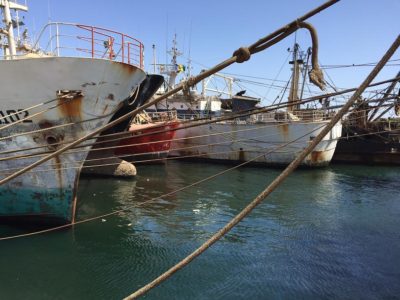
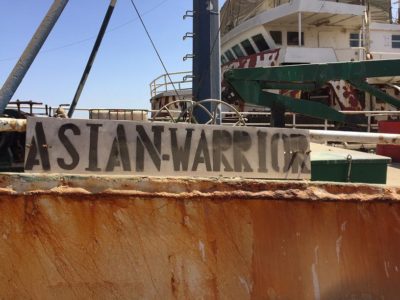
The Kunlun, renamed the Asian Warrior ̧ was finally captured in the port of Dakar.
Revenge Has a Sweet Taste
While there were no fish or fishing gear onboard the Asian Warrior, the skipper of the neighboring boat said that the crew had landed the catch in 30 minutes in the middle of the night. Cheikh Fall told us that authorities finally caught up with the fish in Vietnam.
Walking on top of the poaching vessel created a strange emotion, Dyhia Belhabib said, “It felt like revenge has a sweet taste. I spent 5 years putting numbers on names and definitions, assessing the loss, reading about the poor conditions and poverty these boats create and spread wherever they go.” She added, “The joy and satisfaction of me stepping on a decaying IUU vessel, quickly transformed to pride when I heard the story from Cheikh.” It felt good to know that he, and others like him, were committed to tackling illegal fishing in Senegal as well as on a global scale.
